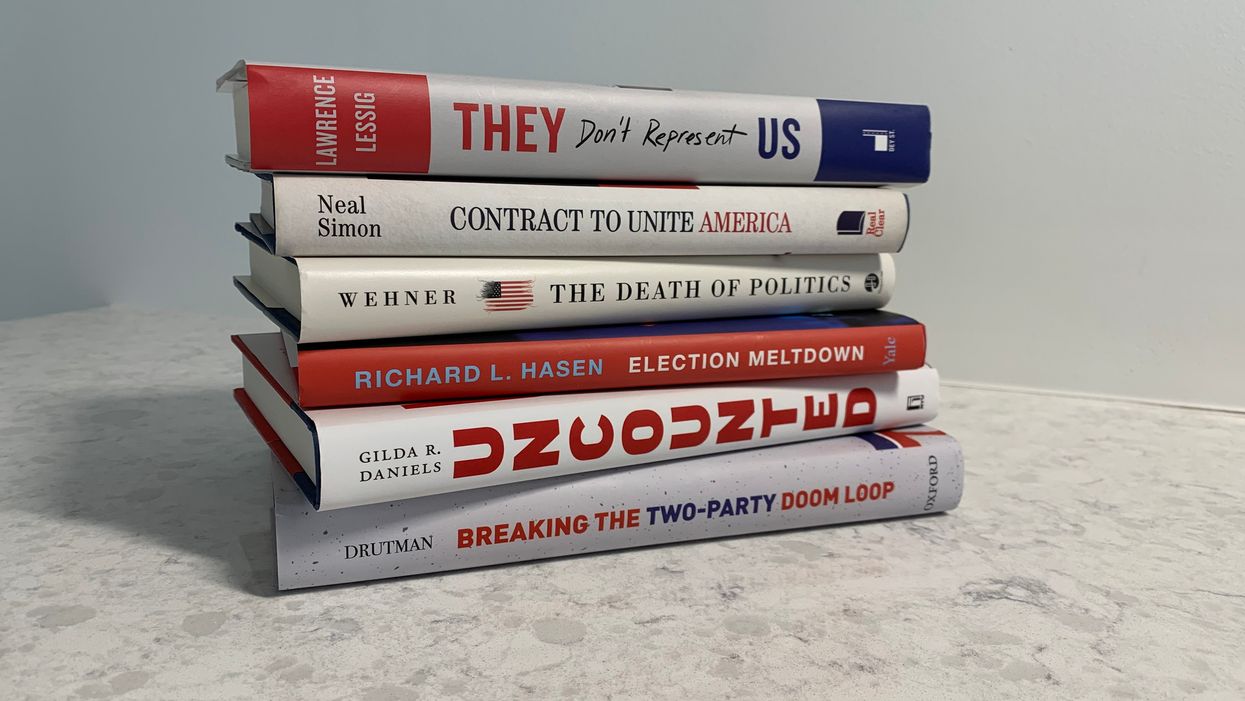"Groaning bookshelves about our divisive times" are one of the main features of the publishing world these days, Kirkus Reviews notes. So we identified six books, all published since last summer, that are particularly worthy of note in a campaign season when the faulty functionality of American democracy is getting discussed more than in any previous modern election.
The authors come from the political left, right and center — but they all have a broadly similar panoramic view of the dysfunction plaguing our democracy. And their prescriptions for reversing the decline have more in common than not. What they all agree on: The principles of our Constitution are under assault and the citizenry's only chance at a successful counter attack is by embracing a broad array of plans for strengthening democratic institutions.
The books deconstruct the causes and consequences of about a dozen of the most undemocratic aspects of the way the country is operating — all of which are likely making the Founders spin in their graves. Polarization and partisan tribalism engineered by the Republican and Democratic duopoly, congressional gridlock, the excesses of money in politics, restrictive voting rights, partisan gerrymandering, weakened checks and balances, and shoddy ethics in government are the familiar topics at the top of their list.
There's also a welcome similarity to their fix-the-system agendas. While they differ enough to make all the books worth a read, it's fair to say they're all interested in putting the voters back in charge of the country — if for no other reason than the political class and their moneyed interests have made such a hash of it.
That in turn, leads them to their most fundamental shared recommendation: The citizens must be persuaded to become much more civically engaged and demanding of the changes that would benefit them.
'Breaking the Two-Party Doom Loop: The Case for Multiparty Democracy in America' — By Lee Drutman (Oxford University Press, 271 pages, $28)
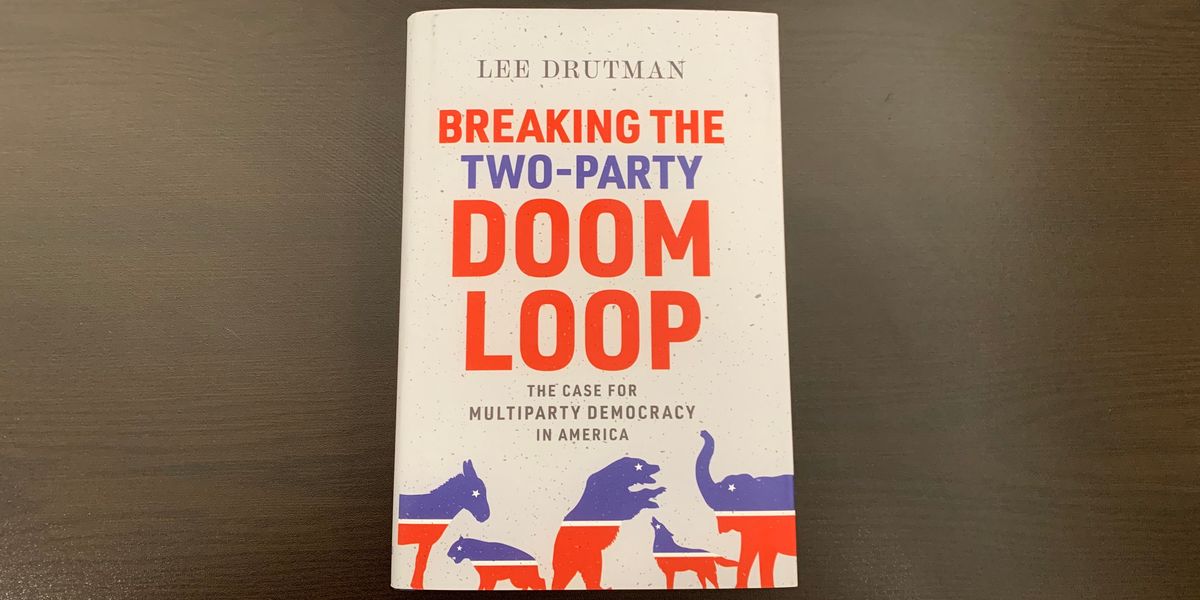
Sara Swann/The Fulcrum
Drutman, a senior fellow at the Washington think tank New America, has a forceful argument to make that the dominance of the Democratic and Republican parties over our politics has become so toxic that it's on the verge of destroying American democracy. He sees the only salvation as converting to a multiparty system, and quickly.
Before unspooling his view that the partisan duopoly is destroying his country — through a collection of "doom loops" that are a spine of the book — Drutman offers a short course on the history of American political parties, beginning with the Founders' warnings about factions destroying our democracy, through the Civil War-era origins of a two-party system that for decades was at the heart of the coalitions and consensus that shaped public policy.
His journey ends in the "toxic partisanship" quagmire of today, a nationalized and radicalized two-party system defined by geography, culture and race. "This undermines forbearance and restraint," he says, a situation made worse at a time when national identity has defined the partisan conflict and pushed economic inequalities to the back of voters' minds.
"The separation-of-powers governing institutions are on the side of negotiation and compromise, in line with multiparty democracy," he writes. "Today's party system is fundamentally at odds with America's compromise-oriented governing institutions. And the mismatch is unsustainable."
Drutman tries to prepare us for the consequences of looking away: Democratic breakdown and tyranny await and "partisan fighting would beget more partisan fighting until self governance collapsed into authoritarianism." That's one doom loop.
And, when Americans turn to a demagogue to bail themselves out of that loop and otherwise solve all their problems? Thanks to partisan gridlock and a weak Congress, the presidency becomes dangerously more powerful, which in turn raises the stakes for the next election, making the polarization even worse than before. In other words, another doom loop.
He's got many, many more of them. "A decade of conservative propaganda about voter fraud had made a deep and dangerous impact," he writes, and given that "democracy depends on shared fairness," the assault on voting rights "is a legitimacy crisis waiting for a demagogic loser to provoke it."
For much of the second half of the 20th century, the ideological breadth of both parties meant the country essentially had four from which to choose: liberal and conservative Democrats and liberal and conservative Republicans. Since "each represented distinct and meaningful voting factions, Drutman writes, they produced a democratic ideal of competition and compromise as the norm. But no more. Since the 1990s, the parties have reoriented from too little partisan competition to too much — and from too much compromise to too little.
Drutman offers the solution. "In a multiparty system, polarization is not paralyzing because the center is always engaged. Multiparty democracies are more stable and responsive, economic inequality is lower. Parties are stronger. Voter turnout is higher. Compromise is more valued. Citizens are happier and more satisfied with the state of democracy."
Among the ways to bring back multiparty democracy, he proposes various electoral reforms including the creation of multimember congressional districts, their members chosen with ranked-choice voting and the candidates subject to stricter campaign finance regulation.
Two-thirds of Americans want the multiparty democracy he's advocating, he maintains. And so, Drutman asks, what are we waiting for?
'Contract to Unite America: Ten Reforms to Reclaim Our Republic' — By Neal Simon (Real Clear Books, 211 pages, $28)
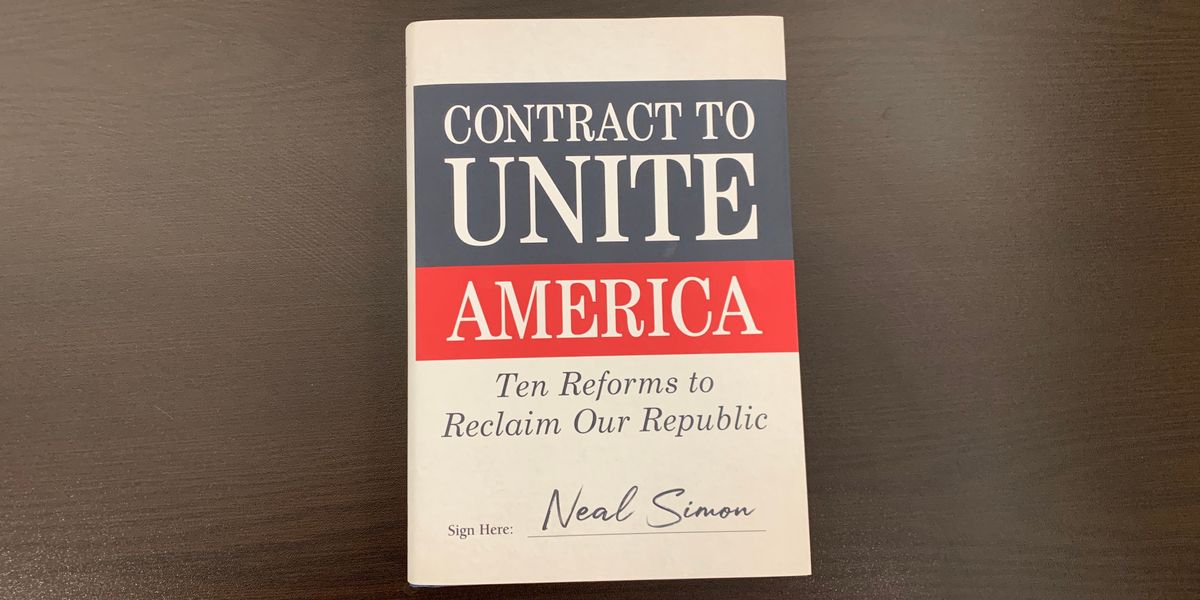
Sara Swann/The Fulcrum
After running four businesses, including the investment advisory firm Bronfman Rothschild, and serving on the boards of several prominent Maryland nonprofits, Simon decided it was time to really enter the arena in 2018. He ended up with just 4 percent of the vote as an independent candidate for the Senate, but the experience has only magnified his role as a democracy reform philanthropist and proselytizer. This is his 10 Commandments for fixing the system.
One of the reasons Simon decided to run for Congress was his view that too many politicians have lost interest in fighting for the American people — because they are too focused on fighting each other. Having tried his hand at being a "politician" he now describes himself as a "uniter," which is why he says he ran to begin with.
He argues that hyperpartisanship has contributed to a systematic breakdown of the electoral system and a failing Congress. Washington has become chronically incapable of solving problems because elected people flatly refuse to work toward compromise and consensus, Simon says, and, "If our elected officials cannot put aside partisan concerns in areas where there is broad consensus, how can they tackle complicated issues?"
He laments the Republican and Democratic parties that have become behemoths bent more on their own hold on power than on the desires of team members to try to do right by their constituents, even if that means straying from the party line from time to time. Candidates are forced to embrace what he terms "a perverse set of incentives," selling their souls to donors and party leaders at the expense of the people who elect them.
"A critical mass of Americans knows that what we have is broken," he asserts. "While things in Washington are much worse today, the good news is that more people realize it. Thousands of would-be reformers have joined over one hundred groups."
The bulk of the book is his detailing 10 proposals to "reshape the incentives in our political system," each of which he says has support from at least three of every five voters.
Nine of them are pretty straightforward: opening primaries to all voters, regardless of party; expanding the use of debates during congressional and presidential campaigns; limiting the tenures of House members to six years and senators to 12 years; increasing disclosure requirements for donors who give as little as $100; amending the Constitution to allow a revival of more robust campaign finance regulation; making it easier for candidates not aligned with a major party to get on the ballot; turning political mapmaking over to independent commissions; creating House districts with multiple members, elected through ranked-choice voting; and revamping the rules of Congress to promote bipartisan legislation.
The final item is a bit more aspirational and multifaceted — the adoption of a "culture of unity" platform by Washington including a revival of civics education and mandatory national service for young people, commitments by future presidents to assemble a bipartisan senior administration team, and a commitment by members of Congress to sign a civility pledge.
"It's time for Americans to save each other," Simon concludes. "At the least, we need to learn how to work together again for the common good."
'The Death of Politics: How to Heal Our Frayed Republic After Trump' — By Peter Wehner (Harper Collins, 234 pages, $26)
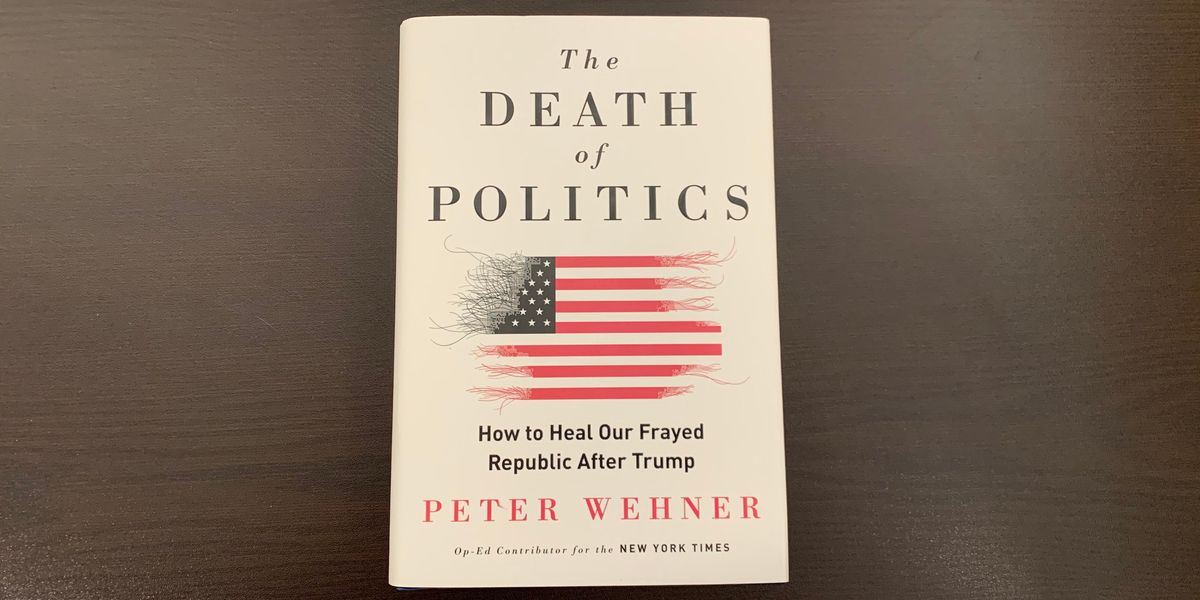
Sara Swann/The Fulcrum
Wehner is a senior fellow at a conservative think tank, the Ethics and Public Policy Center, after having done serious work in the Reagan White House and both Bush administrations. It's a resume that put newsworthy punch behind the most famous thing he's ever written: an op-ed in The New York Times in January 2016, before the Republicans primaries began, declaring he would never vote in a primary or general election for Donald Trump.
His "virulent combination of ignorance, emotional instability, demagogy, solipsism and vindictiveness would do more than result in a failed presidency," he wrote. "It could very well lead to national catastrophe."
This book is Wehner's prescription for what should happen now that his prediction has proved alarmingly short of that horrible mark. Civic discourse has become even coarser and more damaging than he imagined four years ago, he says, and Trump's disdain for the truth even more aggressive.
"Democracy requires that we honor the culture of words," says Wehner, who was a speechwriter for President George W. Bush. "When words are weaponized and used merely to paint all political opponents as inherently evil, stupid, and weak, then democracy's foundations are put in peril."
The damage Trump has wrought to American political and democratic institutions, he maintains, will only start to get reversed if a critical mass of his fellow Republicans declare a willingness to work with Democrats to incubate a revival of civic engagement and a restoration of a civic culture where the absence of polarizing behavior is a rewarded virtue.
First, Wehner explains how we got here — in an extensive civics lesson with forays into the philosophies behind democracy, American history, the constitutional balance of powers and how previous recent presidents behaved.
He reintroduces the reader to the teachings of Aristotle, Locke and Lincoln and how they made the contributions that define American politics today: "One of the things I have learned from studying their lives is that politics is an art, not a science, and that the application of human ideals to human society is an immensely complicated task. No one ever gets it exactly right."
The "contempt for the political class" within the electorate that fueled Trump's rise, as he sees it, was born of a toxic mix of demographic disruption, economic anxiety in the middle class, polarization, distrust and invective. But he also says the governing class has done plenty to contribute, through its "a detachment from and an indifference toward the hardships facing tens of millions of Americans over the last several years."
Wehner sounds horrified at the way Trump uses words "to murder the very idea of truth." He also fingers the media as complicit in this corrupt enterprise: "His mastery of social media — and the media's ravenous need to cover Trump's every utterance — has given him the ability to invade and permeate people's thoughts and lives in unique ways."
Wehner, who's seen among the most thoughtful evangelical Christian political minds, also sounds appalled at how that crucial share of the electorate has become so unflinchingly loyal to the president. It's a consequence, he concludes, of the all-or-nothing nature of today's politics.
'Election Meltdown: Dirty Tricks, Distrust, and the Threat to American Democracy' — By Richard L. Hasen (Yale University Press, 138 pages, $28)
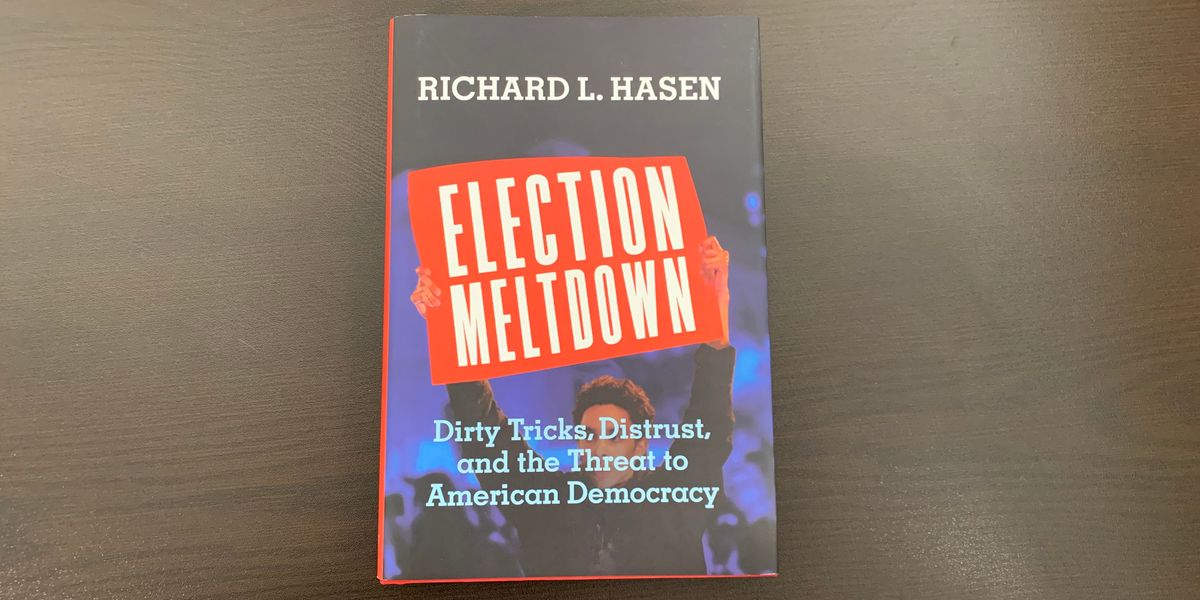
Sara Swann/The Fulcrum
A professor of law and political science at the University of California-Irvine, Hasen is a recognized expert on election law and a prolific author. He's combined those traits in his fifth mass-market book — a hard-hitting, cogently argued and brief takedown of the ways voting gets conducted in this country.
He warns that a widespread absence of both fairness and accuracy in elections has made the public justifiably distrustful of the process and appropriately worried their votes truly won't count this fall. And if those fears are borne out the crisis of confidence in the system could reach unprecedented levels, especially if they end up providing an opening for Donald Trump to do what no sitting president has done before and refuse to concede he's lost re-election.
"Our democracy depends on confidence in the fairness of the vote, and on the losers' acceptance of election results," Hasen notes crisply, but that formula may be scrambled in a close contest in November that Trump concludes has been tainted with "unsubstantiated claims of voter fraud."
Four central threats contributing to our mistrust, Hasen says, and they both separately and synergistically undermine voters' trust that election results reflect the will of the people.
The first is the suppression of voter registration not only through predictable means — Republican legislators pushing restrictive rules in states with potentially high (and Democratic) African-American turnout — but also in less widely reported ways, such as requirements that Native Americans living on reservations have street addresses on their voter ID cards.
The second is election administration incompetence. "The use of partisan election officials to decide key election questions" is a principal worry, Hasen says, noting that no state since 2000 has moved from partisan to nonpartisan election administration — the rule of thumb in most mature democracies.
Third are the ubiquitous domestic dirty tricks that have been magnified by the significant technical and strategic abilities of foreign adversaries to hack voting processes and manipulate public opinion. Hasen warns about Russian cyberthreats on America's power grid on Election Day, crippling critical election infrastructure — as well as the domestic extreme partisans mirroring the Russian disinformation methods exposed by Robert Mueller.
Finally, there's the incendiary rhetoric from the candidate-in-chief. In October 2016, Trump declared flatly that "I will totally accept the results of this election — if I win." The president's lawyer Michael Cohen has magnified the growing concern about this time, saying, "I fear that if he loses the election in 2020 there will never be a peaceful transition of power."
And so, Hasen warns, "one of the greatest risks to the integrity of the process comes from the sitting president of the United States." Whether he "poses an actual authoritarian danger to the peaceful transition of power, Trumpism and the Trump presidency have awakened public understanding that peaceful transitions via elections cannot be taken for granted."
'They Don't Represent Us: Reclaiming Our Democracy' — By Lawrence Lessig (Dey Street, 261 pages, $27)
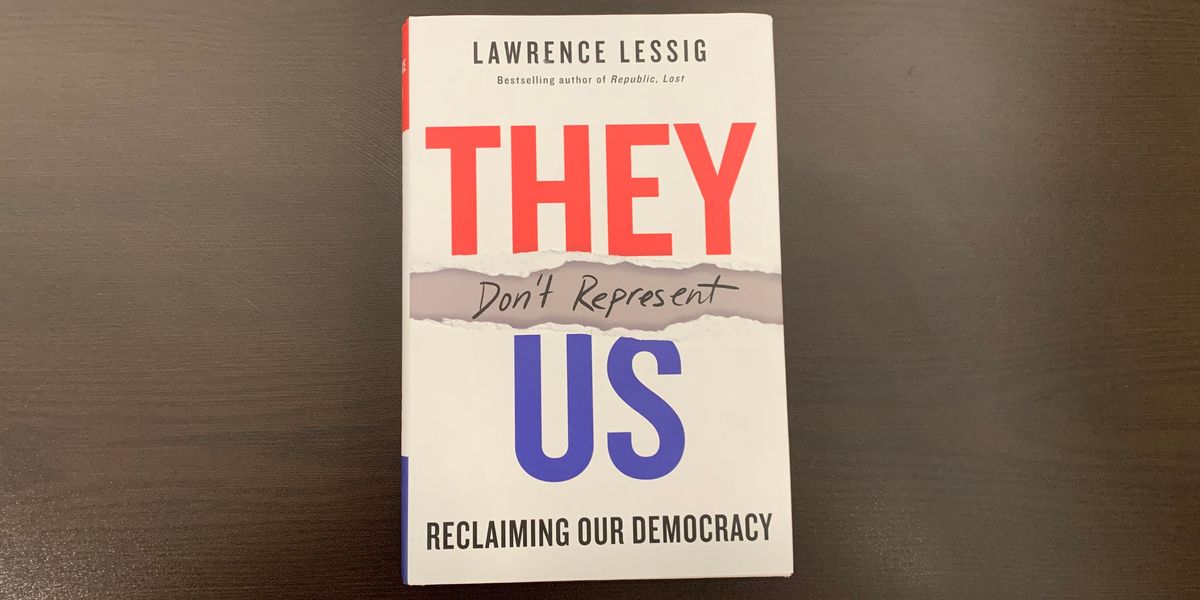
Sara Swann/The Fulcrum
Lessig is a Harvard law professor and something of an omnipresent force in the democracy reform world. He's written five previous books on the topic, created or been on the board of a handful of advocacy groups and briefly sought the 2016 Democratic presidential nomination to promote his ideas for campaign finance limits, curbs on gerrymandering and expanding voting rights.
This time, Lessig writes from a premise that American democracy is at a critical crossroads: Our Founders placed guardrails in the Constitution to protect against extreme partisanship and institutional sclerosis, but the country is running off the rails in a crisis of unrepresentativeness. American democracy is failing and heading toward populism and authoritarianism, he concludes, and the tipping point could come as rapidly as the fall of the Berlin Wall three decades ago.
He sees two core causes of democracy's dysfunction: Americans have become disconnected from "them," the politicians and power brokers. But the problem is also "us," the millions who have allowed ourselves to become misinformed and maneuvered toward political extremism.
Lessig marshals polling to suggest that solid majorities, regardless of party, believe the following about their government: It benefits the big interests rather than all the people; Congress does not serve the common good and, besides, it is dysfunctional; corporations and their lobbyists have too much influence, thanks to a corrupt campaign financing system; elected officials think more about the interests of their donors than the common good of the people; and those same people then get to draw their own political boundaries.
After outlining the flaws that have overwhelmed U.S. citizens and prompted our political and media institutions to this misbehavior, Lessig proposes an array of ideas to save our democracy — or at least contribute to making both "us" and "them" feel more enfranchised.
To help fix the "them" problems, he proposes publicly financed vouchers that voters could use as contributions to candidates; the creation of House districts with several members each, chosen through ranked-choice voting; an array of Senate rule changes, including an end to the filibuster, to reduce the disproportionate power of small-state senators; and replacing the winner-take-all rules for the Electoral College with the awarding of electoral votes proportional to a state's popular vote result
The main way to fix the "us" problem, Lessig says, is to ignite a new culture of civic engagement. To help that along, he envisions the convening of all manner of panels of randomly chosen Amercians: "civic juries" to brainstorm changes in pubic policies, citizen assemblies to make recommendations to Congress, shadow conventions to propose changes to the Constitution and even shadow Congresses to press compromise ideas on the real but gridlocked senators and representatives.
One of Lessig's most provocative observations is that democracy is being harmed by a hyper partisan news echo chamber that gives too many of us what we crave but not what we need — a result of the end of the era when a relatively small number of media institutions put enormous numbers of people in the service of accuracy and balance. While the internet has "banished the censor" it's also "banished the editor" — and empowering more such people to act as the public's agent in finding the truth, he says, is a crucial part of democracy's path back to legitimacy.
'Uncounted: The Crisis of Voter Suppression in America' — By Gilda R. Daniels (NYU Press, 211 pages, $30)
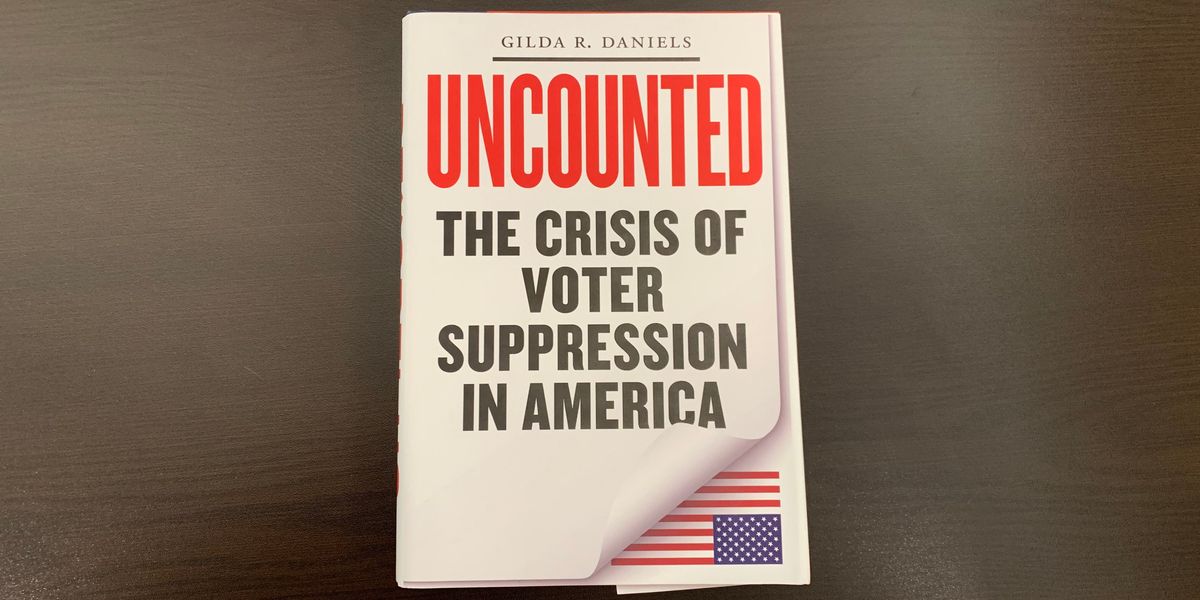
Sara Swann/The Fulcrum
Daniels is an associate professor of law at the University of Baltimore but was a senior official in the civil rights division of the Justice Department in both the Bill Clinton and George W. Bush administrations, making her keenly qualified to explain the decline and fall of one of the landmark democracy reforms in American history.
When it was enacted 55 years ago, the Voting Rights Act was viewed as the pinnacle achievement of the civil rights movement. And it generally worked as designed for the next five decades — assuring that many thousands of people, particularly African-Americans in the South, could register and then protecting their exercise of the franchise.
But if Selma, Ala., serves as the symbolic birthplace birthplace of the VRA, then Shelby County, just an hour and 15 minutes up the road, serves as its burial place.
Just shy of its 48th birthday, in the summer of 2013, the law was effectively killed by the Supreme Court through the landmark Shelby County v. Holder decision, ruling that the statute's beating heart provision couldn't be used any more because it was fueled with unconstitutionally outdated facts. This was the so-called preclearancesection, which said states and localities with bad records of political discrimination had to get advance approval from Washington before changing any legislative boundaries, election laws or voting procedures.
"This decision gave the green light to jurisdictions that had as their mantra to turn back the hands of time on the right to vote," Daniels declares, labeling the decision "a direct reaction to the 2008 presidential election of the first African American."
Daniels recounts in vivid detail how aggressively so many states across the old Confederacy moved to take advantage of the decision, many of them literally within days, with any array of rules and behaviors making it much more difficult to vote: Shuttering polling places or closing them earlier than before, tightening what's acceptable as a voter ID, purging people from the rolls simply because they haven't cast ballots in a while, broadcasting deceptive or intimidating information about the when and where of Election Day.
She also highlights the intensifying struggle to reverse decades' worth of state laws preventing people out of prison from returning to the ballot box — "a vestige of a white-supremacist movement that decided that only white males should enjoy the unfettered right to vote."
She sees all this as an undeniable effort by Republicans, in charge of most areas once subject to preclearance, to suppress the turnout by those who vote decidedly Democratic. And it's not just African-Americans who are the victims, she notes: "Changing demographics — that is, the exponential growth of the Latin and Asian American communities — have spawned an expanded approach to disenfranchisement with proof of citizenship and punitive immigration laws."
Too many American citizens are "sleeping at a dangerous time," unaware this suppression of a few harms democracy for all. And yet, the book holds out hope the tide of suppression will turn — believing that a convergence of "litigation, legislation, social media, community building, organizations, and social, professional, and religious alliances" is in the offing to make that happen.
Those forces, she says, should turn their attention to several proposals for returning to a time when our political rights were much easier to exercise — enshrining the right to vote in the Constitution, ideally, but at least making Election Day a federal holiday and spending more taxpayer money to promote voter education and turnout.





